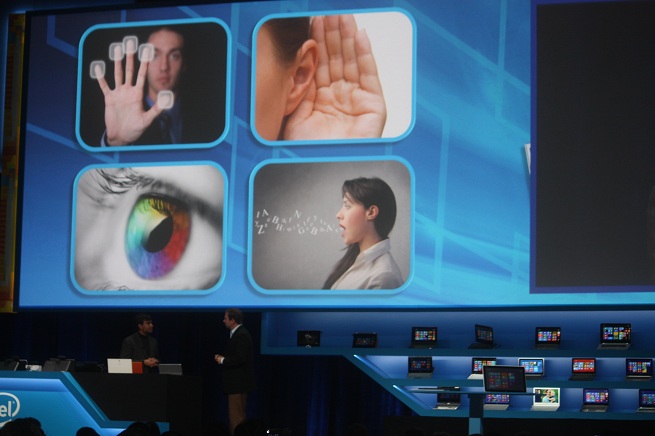Intel says it is making progress on its “perceptual computing” initiative to make computers more intuitive to control.
Last year, Intel talked about how it wanted to go beyond touchscreens and equip everyday computers such as desktops and laptops with technologies such as gesture control, face recognition, voice recognition, and eye control. This year, those initiatives have all taken shape, said Kirk Skaugen, the vice president of the PC client group at Intel, in a press event at the Consumer Electronics Show in Las Vegas today.
Back in September, voice recognition firm Nuance announced it would provide technology for a series of Dell ultrabooks, or thin and light laptops. That fulfilled on promise of perceptual computing.
Intel showed a demo of Valve’s Portal 2 being played with gesture controls, using motion-sensing technology from Sixense. That game shipped last fall, making it possible to play it by waving your hands around in front of a computer.
“Gaming is very interesting, but we can do other things with this technology,” Skaugen said.
For instance, you can hold more interesting video conferences with coworkers. Using a technology from Personify, Intel showed how you can hold a video chat with coworkers and insert their images into the presentation that everyone is sharing. Since each person viewing the presentation can see the expressions of coworkers, they can more easily tell what kind of reaction coworkers are having.
Skaugen also showed that — not only is gesture computing good for computer games — it is also useful for computer security. He said that face-recognition technology using special webcams is coming along. And both face recognition and voice recognition will provide for much better computer security in the future. Skaugen noted that a recent breach of passwords showed that the top password that people use is “123456.” To get around the problem of character-based passwords, Skaugen believes that perceptual computing will provide security that will be hard to defeat.
VentureBeat's mission is to be a digital town square for technical decision-makers to gain knowledge about transformative enterprise technology and transact. Learn More

